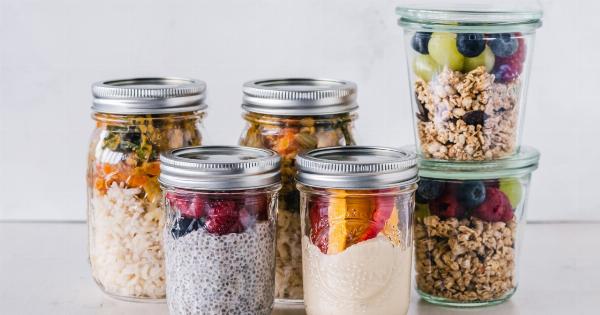As we age, it’s normal to experience some changes in our cognitive function and memory. However, certain lifestyle factors, including diet, can play a significant role in preventing or slowing down brain aging.
Incorporating specific foods into your daily meals can provide essential nutrients that support brain health and function. In this article, we will explore 30 foods that can help prevent brain aging and keep your mind sharp and vibrant.
Blueberries
Blueberries are often hailed as a superfood for their numerous health benefits, including promoting brain health.
These delicious berries are rich in antioxidants, which help protect the brain from oxidative stress and inflammation that contribute to brain aging. Enjoy blueberries fresh, frozen, or in smoothies for a tasty and brain-boosting treat.
Broccoli
Broccoli is a cruciferous vegetable packed with vitamins, minerals, and antioxidants, making it a nutritional powerhouse. It contains compounds that help reduce inflammation and oxidative stress in the brain, promoting optimal brain health.
Steam or lightly sauté broccoli to retain its nutrients and enjoy it as a side dish or add it to stir-fries and salads.
Turmeric
Turmeric is a spice known for its vibrant yellow color and potent anti-inflammatory properties.
Curcumin, the active compound in turmeric, has been shown to cross the blood-brain barrier and exert powerful antioxidant effects, protecting the brain from damage caused by free radicals. Sprinkle turmeric in curries, soups, or make a healthy turmeric latte to reap its brain-boosting benefits.
Salmon
Salmon is an excellent source of omega-3 fatty acids, particularly DHA (docosahexaenoic acid), which is crucial for brain health. Omega-3 fatty acids support proper brain function, reduce inflammation, and may help prevent age-related cognitive decline.
Aim to include fatty fish like salmon in your diet at least twice a week to support brain health.
Spinach
Spinach is a leafy green vegetable packed with essential nutrients, including vitamins A and K, folate, and iron. It is also rich in antioxidants that protect the brain from oxidative stress.
Regular consumption of spinach has been associated with improved cognitive function and enhanced memory. Add spinach to salads, omelets, or sauté it as a nutritious side dish.
Walnuts
Walnuts are a unique nut packed with nutrients that support brain health. They are an excellent source of antioxidants, vitamins, and minerals, including vitamin E, folate, and omega-3 fatty acids.
These compounds have been linked to improved cognitive function and a reduced risk of cognitive decline. Enjoy a handful of walnuts as a snack or add them to your oatmeal or baked goods.
Avocado
Avocado is a creamy fruit rich in monounsaturated fats, which promote healthy blood flow and support brain health. It also contains vitamin K and folate, which help improve cognitive function and memory.
Add avocado slices to salads, sandwiches, or enjoy it as guacamole for a brain-boosting snack.
Dark Chocolate
Yes, you read it right! Dark chocolate, particularly chocolate with a high cocoa percentage (70% or more), is loaded with antioxidants and flavonoids that benefit brain health.
Consuming dark chocolate in moderation can improve blood flow to the brain, enhance cognitive function, and protect against age-related cognitive decline. Indulge in a square or two of dark chocolate as a delightful and brain-healthy treat.
Green Tea
Green tea contains powerful antioxidants, including catechins and polyphenols, that are known to enhance brain function and protect against brain aging. The combination of caffeine and other compounds in green tea promotes mental alertness and focus.
Sip on green tea throughout the day to increase your intake of brain-boosting antioxidants.
Oranges
Oranges and other citrus fruits are an excellent source of vitamin C, which is essential for preventing mental decline. Vitamin C is a potent antioxidant that helps protect brain cells from damage caused by free radicals.
Enjoy oranges as a refreshing snack or incorporate them into smoothies for a burst of brain-boosting goodness.
Tomatoes
Tomatoes are rich in the antioxidant lycopene, which has been associated with a reduced risk of developing neurodegenerative diseases and improved cognitive function.
Cooking tomatoes in olive oil enhances the absorption of lycopene, so enjoy tomato-based sauces or add tomatoes to your salads or sandwiches.
Beets
Beets are packed with nitrates, which your body converts into nitric oxide, promoting blood flow to the brain. Improved blood flow enhances cognitive function, attention, and memory.
Incorporate beets into your diet by roasting them as a side dish or adding them to salads and smoothies for a brain-boosting punch.
Eggs
Eggs are rich in several nutrients that support brain health, including vitamins B6 and B12, folate, and choline. Choline is particularly important for memory and cognitive function.
Start your day with a brain-boosting breakfast by enjoying eggs cooked in your preferred way.
Flaxseeds
Flaxseeds are a rich plant-based source of omega-3 fatty acids, fiber, and antioxidants. Omega-3 fatty acids support brain function and reduce inflammation, while the fiber content promotes gut health, which has a direct impact on brain health.
Sprinkle ground flaxseeds on yogurts, oatmeal, or incorporate them into baked goods.
Quinoa
Quinoa is a nutrient-dense grain that contains a good amount of protein and complex carbohydrates necessary for optimal brain function. It also provides essential amino acids, vitamins, and minerals that contribute to overall brain health.
Use quinoa as a base for salads, soups, or enjoy it as a side dish.
Red Cabbage
Red cabbage is packed with antioxidants that protect the brain from oxidative stress and inflammation. It also contains vitamin K and anthocyanins, which improve mental function and concentration.
Incorporate red cabbage into your diet by adding it to salads, stir-fries, or enjoy it fermented as sauerkraut for an added probiotic boost.
Cauliflower
Cauliflower is a cruciferous vegetable rich in antioxidants, vitamins, and minerals that support brain health.
It is also a good source of choline, a nutrient needed for the production of acetylcholine, a neurotransmitter crucial for memory and learning. Steam or roast cauliflower as a nutritious side dish or use it as a low-carb rice substitute.
Pumpkin Seeds
Pumpkin seeds are an excellent source of magnesium, iron, zinc, and antioxidants that contribute to brain health.
These seeds also contain stress-reducing compounds like the amino acid tryptophan and magnesium, which helps promote better sleep – another important factor in brain health. Enjoy pumpkin seeds as a snack, sprinkle them on salads or blend them into smoothies.
Oats
Oats are a whole grain rich in fiber and nutrients that support brain health. They release energy slowly, providing a steady supply of glucose to the brain.
The fiber content also helps maintain a stable blood sugar level, preventing energy crashes that can affect cognitive function. Start your day with a bowl of oatmeal topped with brain-boosting fruits and nuts.
Ginkgo Biloba
Ginkgo biloba is an herb commonly used in traditional medicine to support cognitive function and improve memory. It enhances blood flow to the brain and reduces oxidative stress, benefiting overall brain health.
Consult with a healthcare professional before taking any supplements containing ginkgo biloba to ensure proper dosage and safety.
Rosemary
Rosemary is an aromatic herb known for its flavor and medicinal properties. It contains compounds that have been shown to enhance cognitive function and memory. Inhaling the scent of rosemary can improve concentration and mental performance.
Add rosemary to your cooking or use rosemary essential oil for aromatherapy benefits.
Chia Seeds
Chia seeds are a rich plant-based source of omega-3 fatty acids, antioxidants, fiber, and essential minerals. These tiny seeds support brain health by reducing inflammation, improving cognitive function, and enhancing memory.
Add chia seeds to smoothies, yogurt, or make delicious chia seed pudding for a brain-boosting treat.
Beetroot
Beetroot is another great vegetable that promotes brain health. It contains natural nitrates that boost blood flow to the brain, improving cognitive function.
Additionally, beetroot is rich in antioxidants and phytochemicals that protect brain cells from oxidative damage. Incorporate beetroot into your diet by juicing it, roasting it, or adding it to salads for a flavorful and brain-healthy dish.
Almonds
Almonds are a nutrient-dense nut that provides essential vitamins and minerals for brain health. They are an excellent source of vitamin E, which has been linked to improved cognition and a reduced risk of cognitive decline.
Enjoy almonds as a standalone snack or use almond butter as a spread for a quick and brain-boosting treat.
Mushrooms
Mushrooms are a unique source of ergothioneine, a powerful antioxidant that protects the brain from oxidative stress and inflammation. They also contain compounds that promote the growth of nerve cells and enhance overall brain health.
Add mushrooms to your stir-fries, omelets, or soups for a savory and brain-boosting addition to your meals.
Kidney Beans
Kidney beans are a legume rich in nutrients that support brain health. They are an excellent source of plant-based protein, fiber, vitamins, and minerals.
The combination of slow-releasing carbs and fiber in kidney beans provides a steady supply of glucose to the brain, promoting optimal cognitive function. Include kidney beans in your diet by adding them to soups, stews, or making delicious homemade bean burgers.
Plain Greek Yogurt
Plain Greek yogurt is a creamy and protein-rich snack that provides several brain-boosting nutrients. It is a great source of calcium, vitamin B12, and probiotics, which support brain health and improve cognitive function.
Enjoy Greek yogurt as a standalone snack, use it as a base for smoothies, or incorporate it into healthy dips and dressings.
Tomato Sauce
Tomato sauce, especially when cooked with olive oil, is a brain-healthy choice. As mentioned earlier, tomatoes are rich in lycopene, which has been associated with improved cognitive function.
Pairing tomatoes with healthy fats like olive oil enhances the absorption of lycopene, providing added brain-boosting benefits. Use tomato sauce as a base for pasta dishes, pizzas, or simmer it with vegetables for a flavorful and brain-healthy sauce.
Kale
Kale is a nutrient-dense leafy green vegetable that supports overall brain health. It is high in antioxidants, vitamins A and K, and folate, which help protect brain cells and promote optimal cognitive function.
Add kale to your salads, smoothies, or lightly sauté it with garlic and olive oil for a delicious and brain-boosting side dish.
Green Leafy Vegetables
Green leafy vegetables, such as spinach, kale, and Swiss chard, are packed with essential nutrients for brain health. They are rich in antioxidants, vitamins, and minerals that protect the brain and support optimal cognitive function.
Including a variety of green leafy vegetables in your diet ensures a robust intake of brain-boosting nutrients.
Coconut Oil
Coconut oil is a healthy fat that contains medium-chain triglycerides (MCTs). MCTs are utilized by the brain for energy and have been shown to improve cognitive function and memory.
Replace other cooking oils with coconut oil or add it to your smoothies for a delicious and brain-boosting boost.
Dark Leafy Greens
Dark leafy greens, such as Swiss chard, collard greens, and mustard greens, provide an array of nutrients that support brain health.
They are packed with antioxidants, vitamins A and K, and folate, which protect brain cells and improve cognitive function. Include dark leafy greens in your diet by adding them to soups, stir-fries, or enjoy them sautéed as a side dish.
Olive Oil
Olive oil is a heart-healthy fat that also benefits brain health. It contains powerful antioxidants and anti-inflammatory compounds that protect brain cells from damage caused by oxidative stress.
Use extra virgin olive oil in salad dressings, cooking, or drizzle it over roasted vegetables for a brain-healthy and flavorful touch.






























